Real Estate Notes | Everything You Need to Know
Investor Bonus: See Investor-Ready Mortgage Notes for Sale Every Thursday
Real estate notes can be a great alternative investment that pays passive income at a great rate if interest while using physical real estate as collateral. In this guide you'll learn everything you need to know to get started...

David Garner
The Investors Guide to Real Estate Notes
Real estate notes have been an important part of well-diversified portfolios of financial institutions, hedge funds, and small private investors alike for many years.
In this article, you are going to learn everything you need to know about this often misunderstood asset class.
Notes for Sale: Get NEW real estate note sales listings in your inbox every Thursday
Contents
- What Are Real Estate Notes?
- The Promissory Note
- Mortgages and Deeds of Trust
- What are Real Estate Notes Used For
- Buying and Selling Real Estate Notes
- What Happens if a Borrower Defaults
- More Real Estate Note Investing Articles
Remember, I am not offering you personalized investment advice. What you do with your money is your business.
That said, I hope you find this article useful, and make sure to subscribe to our weekly Priority Investor email to see exclusive real estate notes for sale that you won’t see anywhere else.
What Are Real Estate Notes?
Notes are all around us, and chances are you already use them every day. All sorts of debt and credit agreements use notes, including car finance, student debt, personal loans… even dollar bills are a form of note.
In short, a note is simply an IOU – an agreement between a borrower and lender where the borrower agree to repay the lender under the terms laid out in the note. Real Estate notes in particular are IOUs that use a piece of real estate as collateral for the loan.

There are, in fact, two parts to every real estate note: a promissory note and a lien. The promissory note contains the terms of the loan. The lien (usually a mortgage deed or deed of trust) is a separate instrument that is recorded in the county land records against the title to a piece of real estate.
Related: What is the Difference Between a Note and a Mortgage?
The Promissory Note
Every promissory note is different because the terms are set between the individual parties at the time the loan is originated. As an absolute bare minimum, a promissory note should contain the following:
- Total amount of the loan
- Monthly payment
- Origination date
- Maturity date
- Loan term (length of the loan)
- Interest rate before default
- Interest rate after default
- Borrower’s address
- Lender’s address
- How payments will be applied?
- Late payment provisions
- Usury Savings Clause
- Any Balloon Payments
The promissory note will also contain waiver clauses to which both lender and borrower agree. Here are some of the waiver clauses you’ll most commonly find in a real estate note:
- Notice
- Demand
- Notice of intent to accelerate
- Notice of acceleration
- Maturity protest
- Notice of protest
- Foreclosure notices that can be waived by law
- Anti-deficiency statutes
The promissory note is held by the lender and returned to the borrower marked ‘paid in full’ when the loan has been repaid. Real estate notes can be bought and sold freely on the open market, so lenders can sell the note to another investor at any time. More about that later!
Related: What is a Promissory Note, and What Terms Should it Contain?
Performing vs Non-Performing Real Estate Notes
If you are thinking of buying real estate notes as an investment, you definitely need to be aware of the difference between performing and non performing notes.
Performing Notes
A real estate note is performing when all payments are current and up to date. Investors buy performing notes for the regular monthly income they produce. The high yields from performing real estate notes are especially attractive to investors when interest rates are low, or financial markets are particularly volatile.
There are a few different types of real estate note that income investors can buy. These include seller finance notes, reperforming notes, and private lending notes. Depending ion the risk attached to the loan, real estate ands borrower, performing notes can deliver a great monthly income at rates of 8% p.a. or higher.
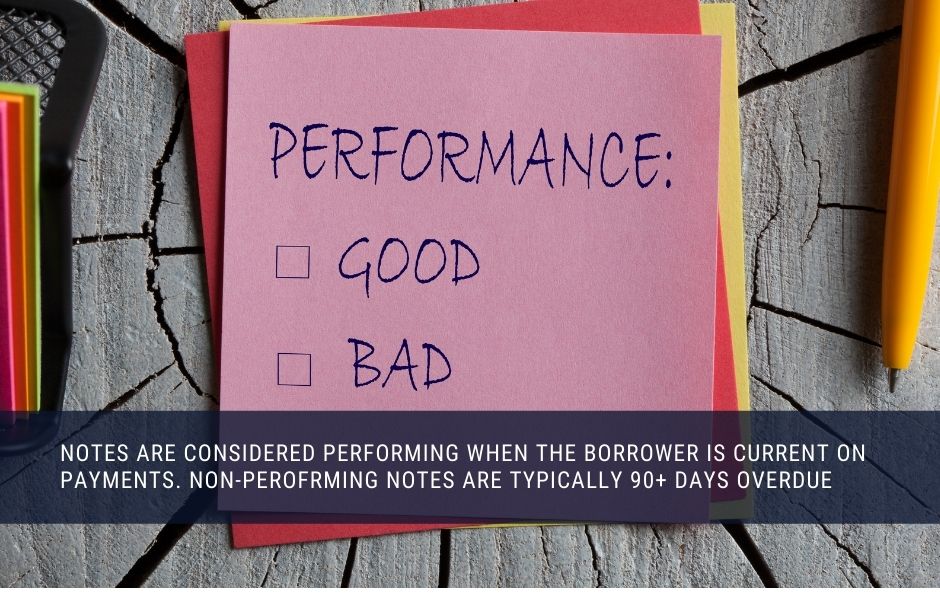
Non Performing Notes
If a borrower stops making payments on a note, it eventually become non-performing. If the borrower fall 30 days behind, the note is considered sub performing. Once the borrower fall 90 days behind on payments you have a non performing note.
When they have exhausted all pre-foreclosure options with a non-paying borrower, lenders will often sell their non performing loans at a discount to the unpaid balance. This puts cash back in the bank, rids their balance sheet of the bad debt, and avoids costly and often lengthy foreclosure proceedings.
Specialist note investors buy these discounted non-performing notes and attempt to renegotiate the terms and/or balance of the loan with the borrower. If they are successful, they have created a reperforming note that they can then sell for a profit, or keep it for the enhanced income.
Sometimes these investors will seek to take control of the real estate through a short sale, deed in lieu or foreclosure. Either way, the basic premise to non performing note investing is to buy the debt cheap and then work out the most profitable solution.
Related: Performing vs Non-Performing Notes – Which is the Better Investment?
Mortgages and Deeds of Trust
The lien is separate to the note. Usually, the lien will be a mortgage or deed of trust depending on the State the real estate is in, and is recorded against the title to the real estate in the county land records.
This gives the lender the right to take ownership of the real estate if the borrower defaults on the terms of the promissory note.
While the specific terminology to be included in a mortgage or deed of trust varies from State to State, every lien should contain at least the following:
- Borrowers’ name(s)
- Real Estate address
- Legal description of the Real Estate
- Amount of the debt
If you are thinking of buying a real estate note, some of the things you’ll want to check on the mortgage or deed of trust include:
- Due on Sale Clause
- Language on Lender Recourse Provisions
- Signed by Borrower
- Notarized by a Notary Public in Good Standing
- Language Requiring Insurance on Property
- Language Requiring Borrower to Pay Taxes Accrued and Due
- Late Charge Provisions
- Foreclosure Procedures
- Accurate Legal Description with Property Lot and Block
Once a loan is fully repaid, the lender should record a release (or satisfaction) of mortgage or a reconveyance of deed in the county land records. This releases the lenders charge over the property.
1st Position vs 2nd Position Liens
If you are even thinking about investing in real estate notes, this is important! The position of your lien on the title to the real estate makes a huge difference to the amount of risk you are taking, and the chances of you getting your money back in a worst-case scenario.
Mortgages and deeds of trust are recorded in either first or second position. A first position lien must be settled first if the property is sold. Second position liens are only settled after the first position has been paid in full. This means that if there are insufficient funds from the proceeds of the sale, lenders with a 2nd position lien might lose some, or all, their money.
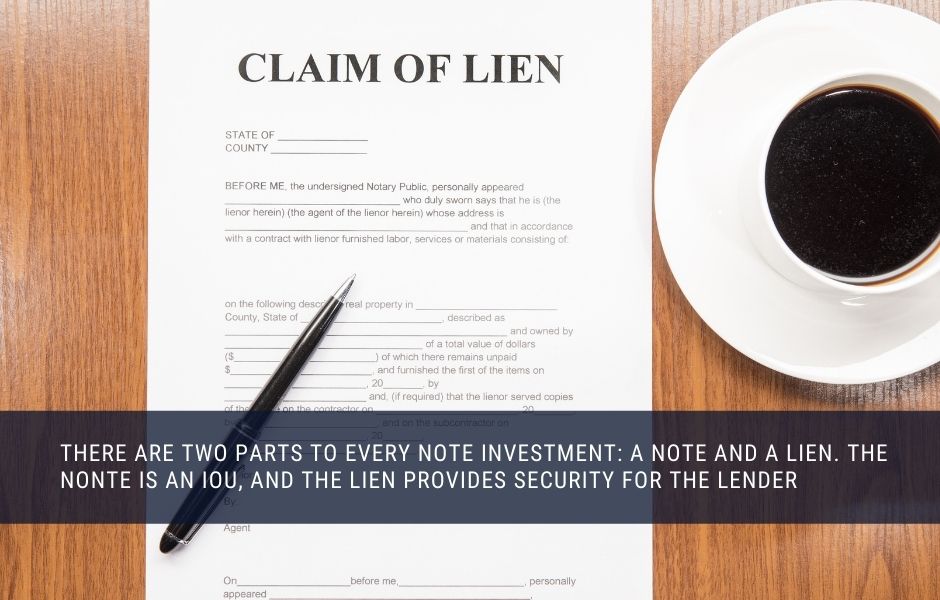
There are also other types of liens that could stand in the way of even a first position lien in a foreclosure. For example, property tax liens almost always take priority over any other liens, as do some mechanics liens and other court ordered judgements.
Because second position mortgages are higher risk, they attract higher interest rates. This might make 2nd position real estate notes look like attractive investments, but they are way more risky, so bear that in mind, especially if you are looking for safe, passive investments that pay monthly income.
Related: The Ultimate Investors Guide to Lien Position and Priority
What are Real Estate Notes Used For
Notes are used in real estate for a wide variety of reasons. Banks and credit unions originate notes when they provide a mortgage or 2nd mortgage to a homeowner. Hard money and private lenders originate real estate notes when they lend money to real estate investors. Sometimes, a seller will carry a note when they sell a property – providing seller financing to the buyer.
You can find all these types of real estate notes for sale on the secondary market.
- Owner Occupier 1st and 2nd Mortgages
- Investment Property Loans
- Seller Financed Notes
- Hard Money and Private Lending Notes
In my business, we use notes originated by private lenders to fund the acquisition of properties for our affordable housing program. We also sometimes sell our homes to our tenants using seller financing, and then sell the seller finance notes on to other investors that are looking for passive income.
Related: Real Estate Notes vs REITs – Which is the Better Investment?
Buying and Selling Real Estate Notes
Real estate notes can be great investments, especially considering how low interest rates are right now. Performing notes pay monthly income at a high rate of interest. They are popular with passive investors, often looking for an alternative home for funds in their retirement account.
Those investors looking for more risk and the chance of bigger profits tend to go after non-performing notes. As I have mentioned, non performing loans can be bought at a big discount to the unpaid balance, and successful loan modifications and/or foreclosures can be very profitable indeed.

In the United States, anyone can buy, sell, or own real estate notes as they are freely traded between investors on the open market. All types of investors own notes, from big financial institutions such as insurance companies and university endowments, all the way down to small Mom and Pop investors looking for a better rate of return on their retirement funds.
Most of the investors in our private lending program invest in real estate notes with their self-directed retirement account such as a Solo 401k, Roth IRA or similar. While some are specifically seeking a better ate of income, many are simply looking to diversify out of the stock market into a wider range of alternative investments with a good return.
When you buy or sell a real estate note, there will be some paperwork. Two of the most important things you will need are an assignment and an endorsement.
Mortgage Assignments
The assignment records the transfer of a mortgage deed or deed of trust in the county land records when a real estate note is sold. When you are buying a real estate note, you need to make sure there is a clear chain of assignment from the originating lender all the way through to the current lender.
The mortgage assignment will contain several key pieces of information, including:
- Legal description of the real estate
- Name of the original lender
- Name of the note buyer
- The date the deed was assigned to the new owner
While it is not required for a lender to tell the borrower if they sell a note. It is the responsibility of the new lender to inform the borrower that they now own the debt and provide them with details of how to start making payments.
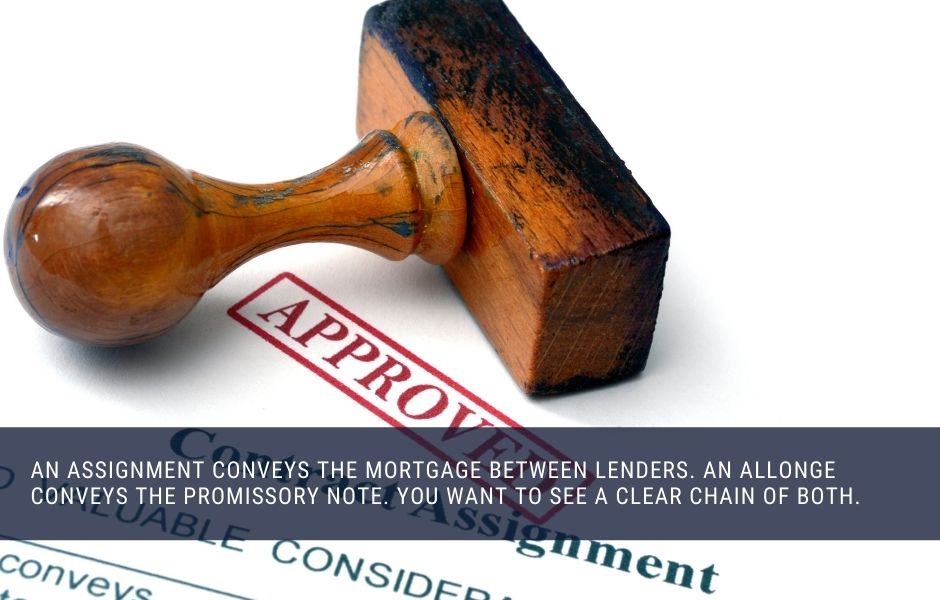
Sometimes a mortgage and its assignments might be held in Mortgage Electronic Registration System (MERS). If the mortgage is recorded in MERS it will have an 18-digit number – called an MERS Identification Number (MINS) – at the top of the deed paperwork.
Note Endorsements (Allonges)
The other important part of a real estate note sale and/or purchase is the endorsement. Known as an allonge, this legal document is attached the the note and records the transfer of the actual promissory note from the seller to the buyer.
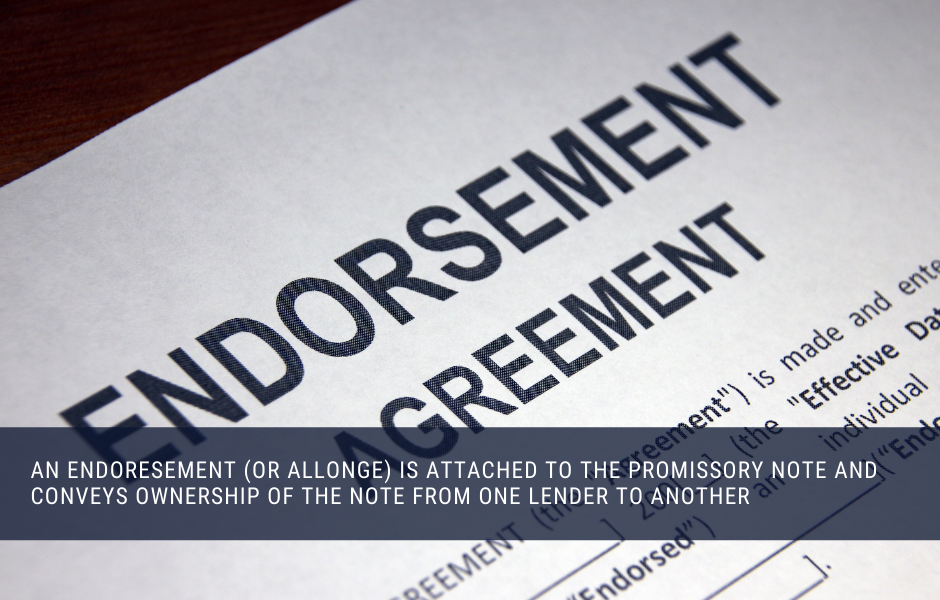
The seller will endorse the note, providing formal recognition that the buyer is now the new owner of the note. Just like a check, a note can be endorsed in blank. This makes the note a bearer instrument, so whoever holds the note owns it and can enforce it.
Related: What is the Difference Between a Note and a Mortgage?
Buying Real Estate Notes Direct from Banks
If you are looking for discounted non performing notes, one of the best sources is of course originating lenders like banks and credit unions. But getting a bank to actually sell you their non performing loans might be trickier than you think.
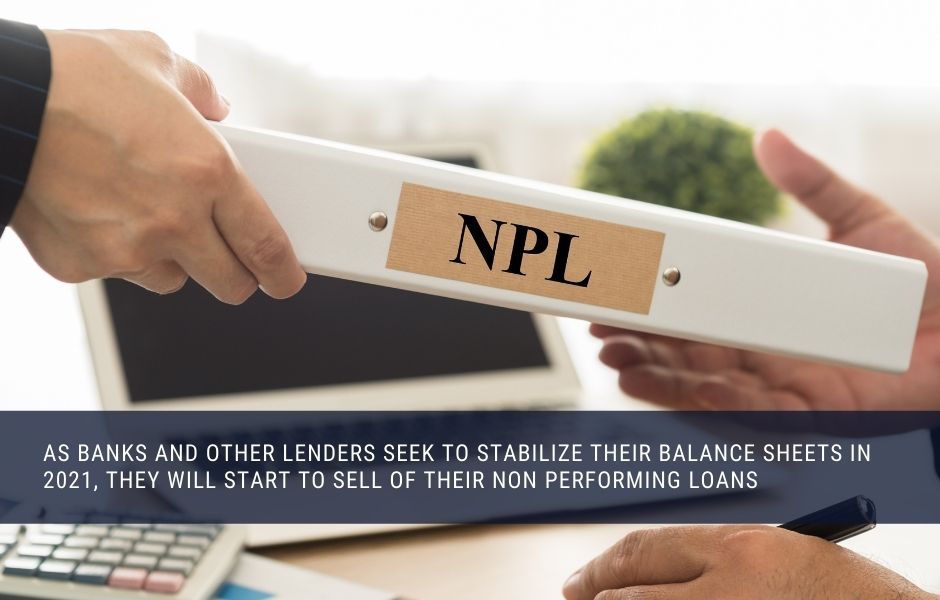
The thing is, the note investing business is a people business. It takes time, effort, and resources to build relationships with the right people at banks who might approve you as a buyer for their non-performing loans. You might also have to have pretty deep pockets to be first in line to purchase the best note pools.
There are some useful online tools that can help you to identify the right contacts at banks with notes to sell. One such platform is Bankprospector. This online tool identifies banks and credit unions that are selling non performing real estate notes and foreclosed real estate (REO). It also provides you with contact details for the seller’s decision maker. Of course, once you have contact details, the rest is up to you!

If you do get approved as a buyer by a bank or credit union, you might get offered a tape of non performing loans. the tape will contains some limited information about the notes, and you will conduct your initial due diligence and make an initial offer based on what you think the notes are worth.
If your initial bid is accepted, the note seller with provide you with the collateral file. This file contains all of the information pertaining to the note, mortgage, real estate and borrower. At this stage you will conduct a much more thorough secondary due diligence and maintain or fade (reduce) your bid.
One word of warning… You must understand that the note buying universe is quite small, and word travels fast. Your reputation is everything, so if you bid on a tape of notes, make sure you follow through. Rarely will you ever get a second chance.
Buying Real Estate Notes Online
If you prefer to buy performing notes, of maybe don’t have the time, energy, or resources to go about building your own network of banks and other lenders from whom to buy non performing notes, there are other options. In fact, there are plenty of places you can buy real estate notes online. These include:
- Online Exchanges
- Note Brokers and Hedge Funds
- Crowdfunding Websites
- Hard Money Lenders
- Private Lending Programs
- Note Investment Funds
You will find that non-institutional notes sellers will list their notes for sale on note trading platforms such as Paperstac. You will find all sorts of notes available for sale there. If you prefer to invest in a real estate note where you really know the borrower, you can look at Garnaco’s Private Lending Program. The online portal has listings of performing notes for sale with Garnaco as the borrower.

There are also lots of note brokers and hedge funds offering notes for sale online. Be careful, though. Often these ‘joker brokers’ will buy large pools of non performing real estate notes from banks, keep the best ones, and sell off the trash notes to the public. You can see my complete list of places to buy real estate notes here.
What Happens if a Borrower Defaults?
Investors love real estate notes because there is a physical asset that backs the debt. If the borrower defaults, the lender has multiple avenues of recourse.
While the terms vary from one note to another, typically a payment is considered late at 30 days. At this point there is usually some sort of financial penalty such as a late fee, and a period in which the borrower can make up the missed payment (cure the default).
A borrower officially falls into default after 90 days of missed payments. At this point the lender will start enforcing the terms of the note and mortgage. This will likely mean accelerating the loan and subsequently starting the foreclosure process.
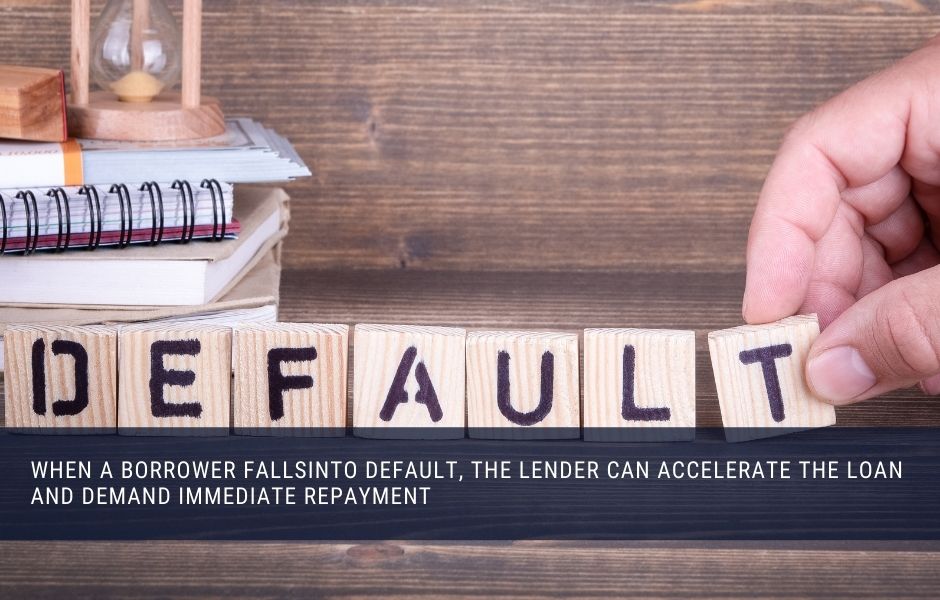
A foreclosure is the legal process in which real estate secured by the mortgage is sold to satisfy the underlying debt. Lender’s often have other remedies to avoid costly foreclosure, such as taking the deed in lieu of foreclosure, selling the property in a short sale, or allowing the owner to sell the property ‘subject to’ the existing loan.
Related: The Ultimate Guide to Assessing Credit Risk for Private Lenders and Note Investors
So there you have it, I hope you found this article useful, or readable at least. If you would like to learn more about my private lending program for investors, just click here to watch the video and see live deals.
Some More Note Investing Articles
- Where to Buy Mortgage Notes – A Complete List of Verified Sources
- Note Investing 101 – Everything you Need to Know About Note Investing
- How to Invest in Notes – 7 Note Investing Strategies
- What is a Note and What Terms Should It Contain?
- Performing vs Non-Performing Notes – Which is the Better Investment?
- The Private Lender’s Guide to Assessing Credit Risk
- Understanding Lien Position and Priority
- How to Buy Mortgage Notes Online in 2021
- How to Assess Real Estate for note Investing and Private Lending
- Find Performing Notes for Sale in 2021
- Private Lending 101 – Everything you Need to Know About Private Money Lending
- Is Buying Mortgage Notes a Good Investment in 2021?
- Note Investing vs Rental Properties – Which is the Best Investment?
- Performing Notes – What Why and How to Buy
- Is Real Estate Note Investing Risky?
- Real Estate Notes vs REITs – Which is the Better Investment?
- The 3 Best Real Estate Investing Opportunities in 2021
- What is the Difference Between a Note and a Mortgage?
- Real Estate Notes – Everything You Need to Know
- My Top 5 Real Estate Note Investing Tools and Resources
- 3 Note Investing Funds for Passive Investors
- Using Note Investing to Boost Your Monthly Income
- Non Performing Notes – Everything You Need to Know


